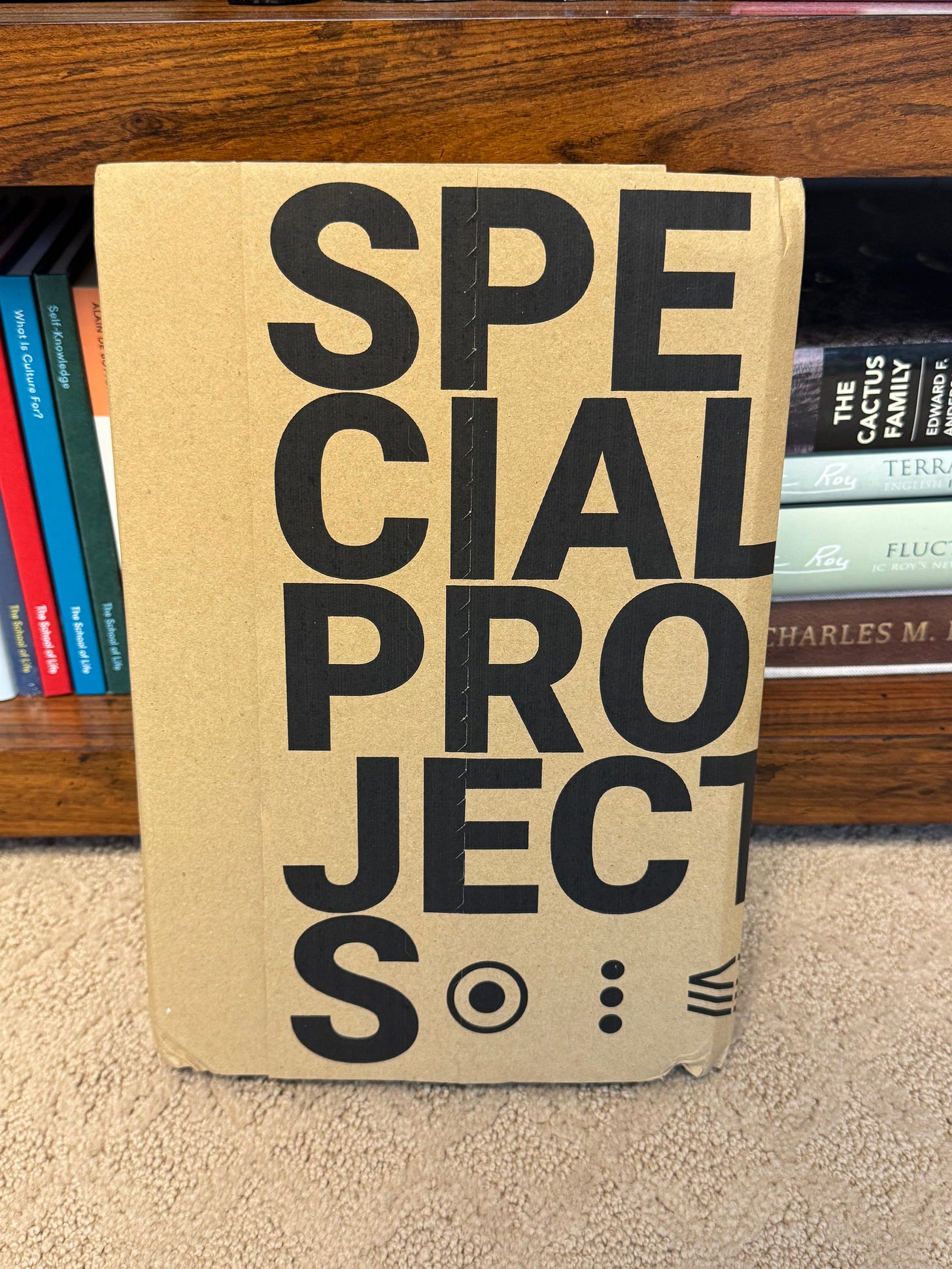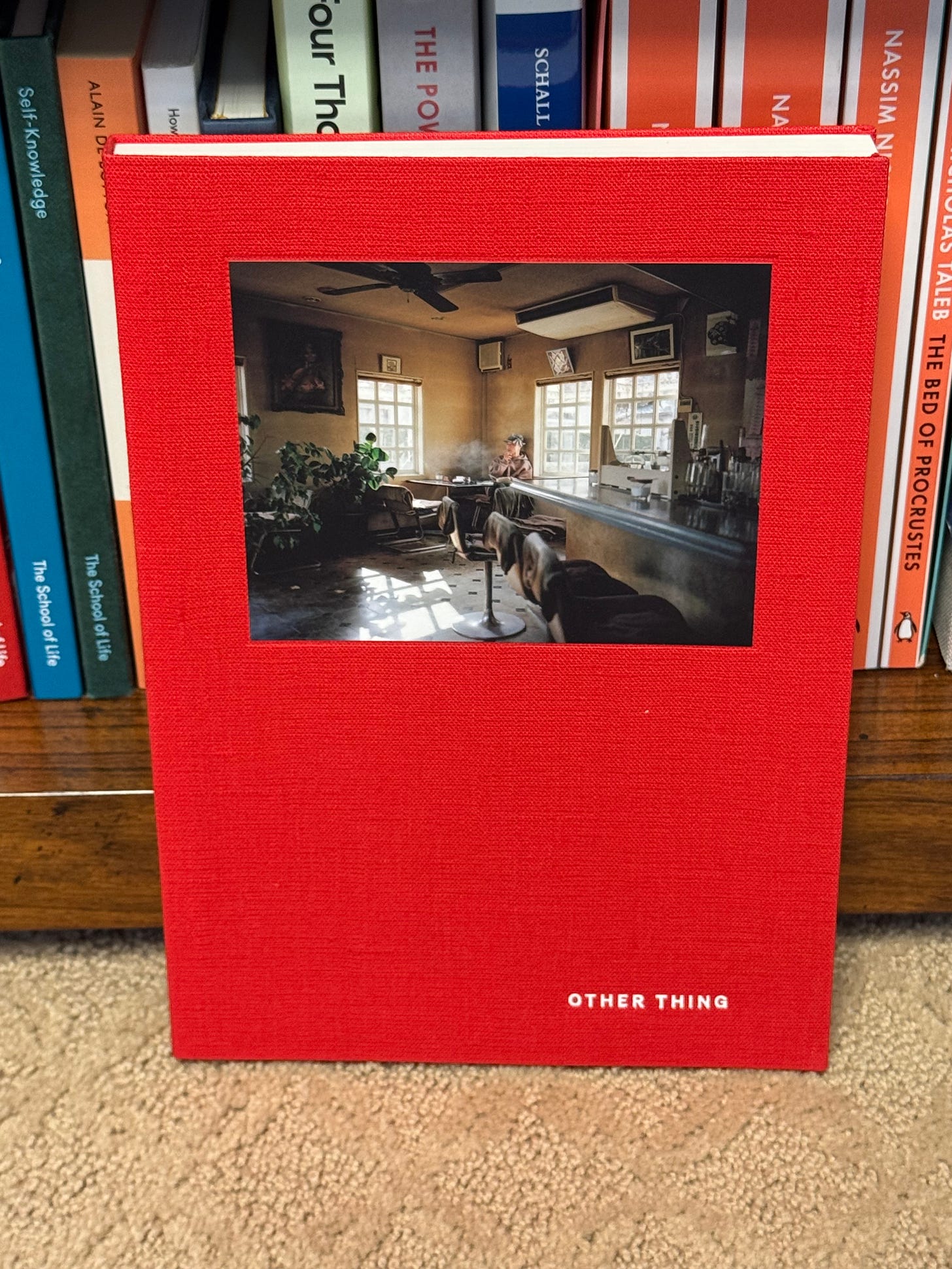The Walk That Spawned Two Books With the Same Title....and a Third Book
A review of Craig Mod’s Things Become Other Things, Things Become Other Things, and Other Thing
I began reading Craig Mod about 4 years ago. I don’t know how I heard of him. Maybe through Rob Hardy. Probably through Rob.
Who was this guy, walking all over Japan – his adopted home – writing about his excursions nearly every day, then publishing these singular and stunning books about ….. kissas? What the what is a kissa? A small, roadside coffee house in Japan? What?
Kissa by Kissa, editions 3, 4, 5, and now in the 6th, reminded me of only one other author – Edward Tufte. Both Mod and Tufte craft books to create a particular reading experience. Tufte – way back when – couldn’t find a publisher to construct books the way he wanted the reader to go through the content. You can’t title a book The Visual Display of Quantitative Information and leave the layout to chance or the publisher’s unknowing scalpel. No – you have a path in mind and you want control over the construction of that path.
In the same way, Mod deliberately created Kissa by Kissa. Lots of white space – huge borders on the page, blank pages — and photos galore. Remember, we’re having a cup of coffee. We can’t be rushed. We want to unwind, unfurl, as it were. White and blue cover, beautifully textured – we learn through our fingers too, our hands. The binding allows you open to any page and lay the book flat, without damaging or creasing the spine.
He clearly reads, and appreciates readers.
When he announced a new book project to document a series of walks in the Kii Peninsula – totaling more than 300 km (or 185 miles), I jumped in.
In September 2023, I received a familiar package – wrapped carefully, almost lovingly, like you’d expect from Japan, where details matter, as with Mod. Beautiful, signed, blue-covered – Things Become Other Things. I held it, this splendid volume so painstakingly fashioned – and placed it on my bookshelf at work. There it sat, unread and unopened.
Later that year or early 2024, Mod announced a deal with Random House to write and publish an expanded version of TBOT. It would be Mod’s first “mainstream” book. It arrived in early May 2025.
I read the Random House version (RH), then his original, fine arts edition (FA). At some point, Mod wrote in a newsletter that he viewed them almost as two different books. Maybe. But he clearly created two distinctly unique reading experiences.
RH reads like a normal hardcover book. Essay after essay. Page upon page. Black print, white page. Black print, white page. He begins by invoking his childhood friend – Bryan – who takes on a role of mystical companion. Mod turns often to his childhood with Bryan in their broken-down, post-industrial, hardscrabble town during the Kii Peninsula walk. Flashes of childhood days with Bryan strike the essays with seeming impending doom. Mod’s friend John joins the walk in spirit as well, a veritable Virgil, through his written musings to Mod, affectionately called “The Book of John.”
Frédéric Gros, in The Philosophy of Walking, contends that walking is not a sport, it is not a labor. Gros is wrong. A walk can be whatever we want it to be – whatever we need it to be. In RH, the walk is a labor. It is work. Mod is annihilating distance. Walk 20 to 40 km. Talk with people. Photograph stuff and people. Stop for the night. Write up thoughts. Sleep. Rise. Walk again. Repeat. Repeat. Repeat. For days, weeks, a month at least. The labor doesn’t only occur through Mod’s feet – he ruminates on the existential crises of his life – his adoption; wayward upbringing; his and Bryan’s ultimately divergent paths; and his welcoming to a home so far from his home.
The crowded pages of RH rush along with Mod. Step, step, step, step, Pound the pavement. Keep going, keep going. Stop to rest, briefly, chat with a local, halt the chat, gotta step step step again. The pages give the reader no break — dashing for the end, hope and forgiveness and understanding and regret throbbing in Mod’s heart, a beating to match his boots stomping the road.
“It’s only through time and distance and effort – concerted, present effort, controlled attention, a gentle and steady gaze upon it all – that you begin to understand old connections, old wounds.”
I felt his crushing fatigue at the end. A good walk. A needed walk. A walk consecrating the idea of solvitur ambulando – solve it by walking, Craig. You can solve life by walking life.
I read RH in two days. I had to. I had to keep going to the end. Like Mod.
Peppered throughout the book – black & white photos from his travels – usually (?) connected with the current essay but not always obviously so. These photos are the weak link in RH – too grainy, too hard for my eyes to differentiate the subtle shades of gray. Too hard to appreciate the details.
Enter Other Thing – a fine arts edition of photos designed by Mod purposefully to accompany RH. He made a smart decision – RH needs his gorgeous photography. I’m glad I ordered a copy as soon as OT launched, and I highly recommend it as an required fellow to RH.
As an aside, one more quibble with RH: the appearance of the title, printed perpendicular to the main text, along the left margin of the left pages and Mod’s name, again perpendicular, on the right margin of the right page. As a constant underliner and note-taker, the margins in a book belong to me, thank you very much. I regretted that hijacked space on several occasions.
Laying aside RH, the next day – finally – I opened FA. It was not labor. This time, Mod took us on a stroll, a tramp even. Same walk, same distance, completely opposite vibe. As in Kissa by Kissa, abundant white space, blank pages, evocative photographs.
I lingered in FA. For hours. I returned to essays and photos. I put it down to reflect and make notes in my journal (for finely printed books like this, I won’t underline or take notes in it. The author has created not only a book, but a work of art – interactive, yes, but not to be soiled by my ink.)
Bryan appears later in FA than RH, but still plays a prominent role. John remains entirely absent, until the “Thanks” at the end. I hope Mod and John follow through on the idea of compiling a “Book of John.” Mod still uses the walk to sift through the same issues of life – but now in a calmer, more reflective posture. He gives himself —and his readers — space and time.
The Kii Peninsula – like Japan – is rapidly depopulating. Mod rarely saw anyone under the age of 45. An entire elementary school in one village had 14 students. He wonders whether anyone – literally – will inhabit this place in 20 or 40 years. Industry has left, opportunity has vanished. He evokes emptiness – hollow, silent, a vanishing way of life. (As an anthropological study, I viewed TBOT – both versions – as a sort of companion to Mod’s walking buddy, technologist Kevin Kelly’s magisterial, huge, three-volume tome, Vanishing Asia.)
Eerily, as I pondered FA and RH, it seemed like time — 2 short years — had drained the color out of the FA photos, into grayish blobs, the photos of RH. That thought haunts me still. The very life force of the place was washing out.
Mod returns again and again to the Kii Peninsula. Indeed, at the end of OT, he notes another project in the works about Kii. “I’ve come to realize the only true walk is the re-walk. You cannot know a place without returning.” Fine, but why Kii? I felt the distinct notion that it’s because Kii reminds him of his childhood home , where opportunity sat up, walked and then ran away in the decades before and years after his birth. Left behind – a wrecked, lost society – Mod’s natural mother, aged 13 years; his rarely-present adoptive father; his mother’s series of trailer park boyfriends; Bryan’s gung-ho postal-worker father. Downtrodden, confused, hopeless – no prospects, no role models on even the flimsiest pedestal to fire ambition and improvement.
Mod is trying to figure out – does the desertion of economic opportunity always wreck the human soul? Is that the lot of everyone in every evacuated industrial city everywhere? Does it have to be that way?
In his walks in Kii, I believe he found an answer, a beckoning of hope. Yes, he found people who probably reminded him of those childhood days. Far more, he witnessed the Japanese ethos of yoyū.
Abundance.
Not of material, stuff, or even opportunity. Yoyū of the spirit.
Exhibited in simple talk, a ride in the rain, hospitality. A smile.
Mod’s walk in Kii awakened in him hope for yoyū not only in Japan, but in the larger world. And at home, even in those sad days of childhood with Bryan. His walk evoked a more nuanced, generous, yoyū-infused light upon that childhood. The most moving passages in TBOT tell of his grandmother and grandfather – of the love they wished for, and sought, and showed.
At one point, Mod encounters an iron craftsman who shows him hundreds of small, iron-wrought statues.
“Like this, he takes an iron rose off the wall and hands it to me. For you, he says. I try to give him money but he laughs, shakes his head, says he’s as rich as he’ll ever need to be.”
As I closed these three wonderful books, I wondered if Mod, too, had become as rich as he’ll ever need to be.
In yoyū. In abundant spirit.







